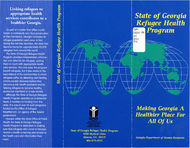(... Who is served
A refugee is any person who is outside his or her country of nationality and who is unable or unwilling to return to that country because of persecution or well-founded fear of persecution. Persecution or the fear thereof may be based on the individual's race, religion, nationality, membership in a particular social group or political opinion.
More than three-fifth of the refugees resettling in Georgia during the calendar year 2000 were from Bosnia, and more than a quarter arrived from Vietnam, Somalia, Iraq and Sudan. Smaller numbers of refugees came from the Middle East and other parts of Africa, Southeast Asia, and Cuba.
(... TheNeed
Often refugees entering into the United States come from war torn areas, refugee camps, or rural areas with limited access to health care. For many refugees, neglected medical needs have been aggravated by crowded and unhealthy living conditions.
Diseases such as tuberculosis and hepatitis B are epidemic in many of the countries from which refugees migrate. As a
result, refugees often enter the u.s. with a
variety of health problems, come without obvious symptoms.
The State of Georgia's Refugee Health Program seeks to ensure that such problems will be identified, treated and given necessary follow-up attention.
By prOViding interpretation/translation and educational services, the program bridges the gap between Georgia's refugees and the health care system.
(... How the program works
A notice of arrival and accompanying medical records for each refugee are sent directly to the state Refugee Health Program by the U.S. Public Health Service Quarantine Station at the refugee's port of entry. The records are sent by the Refugee Health Program to the appropriate local health department, at which time an appointment for a health screening is scheduled.
Program interpreters help refugees to access health care by making appointments, arranging transportation, prOViding interpretation/translation, and outreach services as necessary. The county health department reports health screenings results to the Refugee Health Program.
The Refugee Health Program coordinates with county health departments throughout the state, as well as voluntary agencies who resettle refugees, and other refugee serving organizations to prOVide access to health services for refugees.
Of the one hundred and fifty-nine counties in Georgia, refugees have resettled in about fifty different counries in the state. Dekalb and Fulton counties have the largest refugee populations in the state.
(... Health services provided
During the health screening, new refugees are tested for:
Tuberculosis Hepatitis B Sexually transmitted diseases Parasitic infections Diabetes Anemia
Other health concerns are also addressed during the screening, and appropriate referrals made. Referrals may be made for:
Hypertension Pregnancy Family planning Dental needs Immunizations Family violence Women's health Home health education Mental health The program also makes its library of translated health education materials available to others who work with refugees. Background information on refugee cultures, traditional health care practices, and domestic violence in refugee communities is also available. To learn more about the services of the state of Georgia's Refugee Health Program, please call 404-679-4916.
